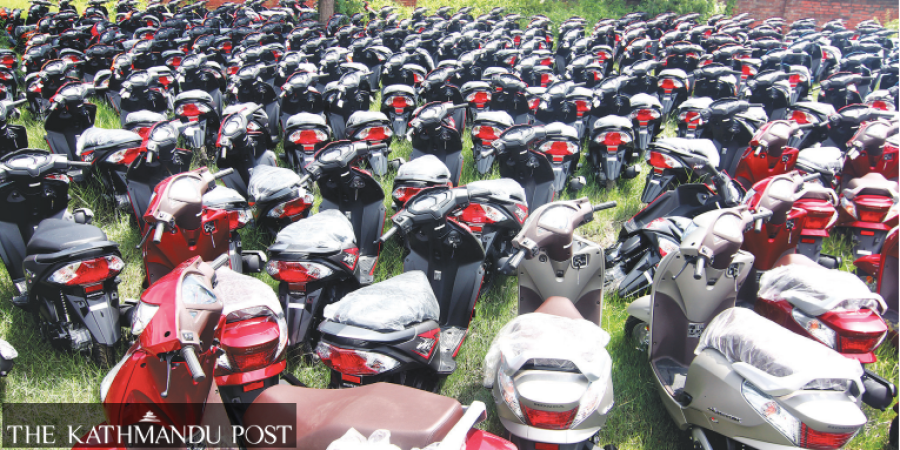Money
Traders complain about margin deposit requirement to import some goods
In 2021, the central bank announced a 100 percent margin deposit requirement for opening an LC to import goods.
Krishana Prasain
Traders are happy that the government has dumped a seven-month-old import ban on “luxury goods”, but complain that continuing the margin deposit amount requirement has been a downer.
On December 20, 2021, Nepal Rastra Bank announced a 100 percent margin deposit amount requirement for opening a letter of credit (LC) to import certain goods.
The stipulation applied to goods under 18 tariff lines, and there was a 50 percent margin deposit amount requirement for goods under two tariff lines.
Subsequently, on February 9, the central bank extended the 100 percent margin deposit amount requirement to 27 tariff lines, and the 50 percent margin amount stipulation to goods under six tariff lines.
According to Nepal Rastra Bank, the 100 percent margin deposit amount requirement applies to alcoholic drinks, tobacco, silver, furniture, sugar and foods containing sweets, glucose, mineral water, energy drinks, cosmetics, shampoos, hair oils and colours, caps, footwear, umbrellas, and construction materials such as ceramics, among others.
As potential importers have been relying on short-term credit without depositing any cash, the central bank's directive is expected to stem the import of these products.
Importers of motorcycles, scooters and diesel-powered private automobiles also need to maintain a 50 percent cash margin with banks to open a letter of credit.
Rajesh Kaji Shrestha, immediate past president of the Nepal Chamber of Commerce, said the government’s decision to lift the import ban was good, but traders are still burdened with the cash margin requirement which is hampering the market.
“Most traders import goods on credit. The government’s mandatory provision of margin requirement means they have to deal with double payment to import goods,” he said, adding that the provision had decreased imports to some extent, but pushed up market prices.
“The stipulation has created a shortage of certain goods which will eventually hit the consumers as prices normally go up,” Shrestha said. According to him, nothing is a “luxury” in today’s world. “Every product is important whether it’s a vehicle or cosmetics.”
As development projects were in great need of construction materials, the central bank on December 3 lifted the margin requirement for the import of products like tiles, marble and stones, boards, sheets, building blocks and bricks of cement or artificial stones and corrugated sheets.
Traders have criticised the government’s decision to lift the import ban on some goods but not on others.
On Monday, automobile traders staged a street protest demanding that the government remove the 50 percent margin amount provision to import two- and four-wheelers.
Dhruba Thapa, president of the Nepal Automobile Dealers’ Association, said that though the government had unbanned automobile imports, there is no environment to import vehicles currently.
“In this situation, only a few will be able to import vehicles. The 50 percent margin amount requirement will definitely raise the price of automobiles,” Thapa said.
“We will be forced to resort to a stronger movement if the government doesn’t address our demands put forth during peaceful demonstrations,” auto dealers warned on Thursday.
Consumer rights activists said that the 100 percent margin amount requirement had made goods like cosmetics, shampoos, hair oils and footwear costlier while they were all essential items in every household.
Nepal’s imports declined by 18 percent to Rs532.69 billion in the first four months of the current fiscal year ended mid-November, but economists say that market confidence too has fallen.
More than 75 car showrooms have shut down, according to the Nepal Automobile Dealers’ Association, as sales plunged. Another 70 are on the verge of closing down, and 8,000 people in the automobile sector have lost their jobs, it said.
According to the central bank's first quarter report, the balance of payments showed a surplus of Rs12.43 billion and gross foreign exchange reserves stood at $9.48 billion, enough to finance goods and services imports of 8.3 months.
"The foreign exchange reserve is at a comfortable level, and the central bank is gradually taking steps to ease restrictions," said Gunakar Bhatta, spokesperson for Nepal Rastra Bank.
“As we lift the import ban, we observe the impact first. After the review, we will further loosen the restrictions accordingly,” he said. “Lifting all the measures at once could put foreign exchange reserves under stress.”
Consumer rights activists said that the 100 percent margin provision had distorted the market.
“When the government makes decisions without any study, especially on products directly linked to consumers, it distorts market confidence,” said Bishnu Prasad Timilsina, general secretary of the Forum for Protection of Consumer Rights-Nepal.




 14.24°C Kathmandu
14.24°C Kathmandu















